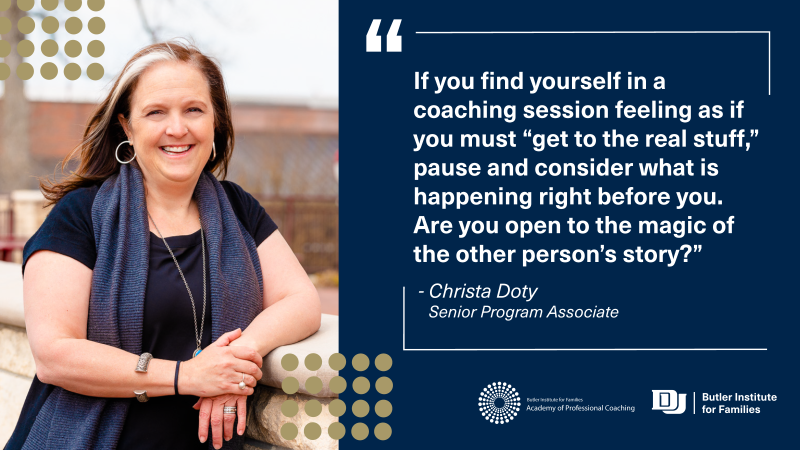I was recently a support person for a colleague’s coaching webinar focused on identifying and honoring culture through coaching. The 90-minute professional development training gathered a batch of coaches we’d recently trained. My colleague is a trained professional coach and Cherokee citizen, so I was excited she would be sharing her perspective with the webinar participants and offering them some tips and tricks to make their coaching sessions more inclusive.
The webinar started with my colleague sharing who she was, where she was from, and who her people were. She talked about her kids, how she arrived at the place she calls home, what her path was to the work she is doing now, and more.
She then proceeded to ask each attendee on the webinar to do the same. As the first few people began to talk, my stomach tightened, and my heart started to beat faster. We had 90 minutes and 17 people in this webinar. How were we going to be able to get through the introductions and still have time to cover the information in the PowerPoint she created? I glanced at the clock in the bottom right-hand corner of my screen every few minutes and checked off in my mind how many more people had to go before we could dig into the heart of the training.
Then this magical thing happened. I stopped looking at the clock and started to truly hear the participants’ stories. I let go of the agenda and listened to what they thought was important and what influenced who they are today.
I have had professional relationships with many of these folks for four years and thought I knew them well. Yet, here in this short amount of time, I was getting to know these individuals on a deeper level. For example, one person had always talked about her step-kids, but when it was her turn to speak, she shared how she considered herself a mom because of her relationship with these children. Another person shared that her parents were part of the civil rights movement in the South and how it had influenced who she is today. Lastly, a participant shared how she was a naturally shy person, which gave me insights into many of our interactions. Each new piece of information told me something about the person’s being.
At 70 minutes in when the last person shared, I had a deeper sense of connection to and appreciation for each person in the virtual room. This glimpse into what and who truly mattered to them filled my heart with warmth and created an extraordinarily profound time together. If I had let my anxiety of keeping to a perceived schedule and reaching “concrete” outcomes override my ability to be present with others, this gift of connection would have been lost.
In the last 20 minutes, my colleague pointed out that this was an exercise—hearing, witnessing, and learning in a way that was culturally normal for her—and she predicted there was some anxiety for many because of the white dominant norms of “doing” versus “being.” The learning was being with each other. For my colleague, to honor culture in coaching, we need to be open to different ways of operating and hearing. Her guidance on how to honor culture was to listen to a person’s story and not always have a to-do list.
When I think about how this experience will influence my coaching, four questions to ponder come to my mind:
-
As a coach, how can I unlearn white dominant norms of producing, urgency, and there only being one right way?
-
How can I be aware of my socialization in white dominant norms and not let them take over?
-
How can I let my coaching be full of rich possibilities that are more inclusive of the individual in front of me?
-
Lastly, how do I need to switch the way I hear other’s stories so that I receive the unique gift of practicing approaches different from the approach I’m accustomed to?
If you find yourself in a coaching session feeling as if you must “get to the real stuff,” pause and consider what is happening right before you. Are you open to the magic of the other person’s story? You and your client might be transformed by what reveals itself by just being present and being with each other.

